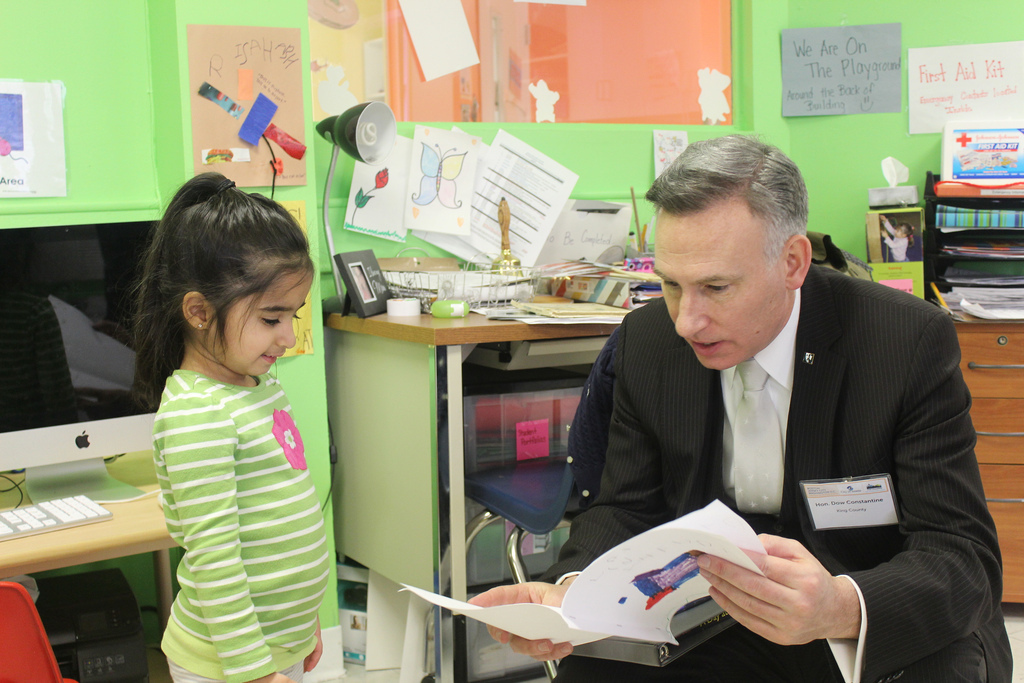Connecting state and local government leaders
In the second of a multi-part guest article series for Route Fifty, King County Executive Dow Constantine examines a complex issue many public officials around the United States are facing in their communities: childhood development.
Introduction: Partners With the People
If you think about it, connected government is what the framers of the Constitution sought to establish. Lincoln later described it as government of, by and for the people. Today—almost 250 years after the nation's founding—we are still seeking that democratic ideal.
But, despite the best intentions, it's not always easy for government and government officials to connect to the community.
As King County executive in Seattle, I've worked to adhere to several core values in an effort to not just successfully serve but to also stay connected with the people I serve.
These core values include:· Delivering excellent customer service
- Data-driven decision-making
- Removing barriers to success
- Building partnerships with community, governments, businesses, and our employees
- Equity and social justice that creates opportunity
- Ensuring financial sustainability
I have found these common-sense principles to work well in just about every area of governance.
In my last article, I discussed how they helped me address the pressing issue of income inequality.
Now, I'll talk about the role they play when we invest in our children's future.
And, in the coming weeks, I'll be writing about staying connected with the people in these important areas:
- Affordable healthcare
- Lean management
- Investing in infrastructure
- Confronting climate change
- Mobility to ensure economic prosperity
- Connecting veterans with services
- Budget efficiency
- Transforming juvenile justice
As a public official, I believe that, if I stay focused on partnering with the people who elected me, we can make sustained prosperity an ongoing reality for generations to come.

Investing in Our Children's Future: Briefing / Background
For me, the purpose of government is to help make sure that every person has the best chance to fulfill his or her potential.
And the best way to do that is to invest in our children.
Ensuring kids are off to a good start sets them on a strong and solid trajectory in life. A good start makes it far more likely that a child will grow into a productive adult who makes meaningful contributions to the community and society.
Every child needs support, especially at-risk children from disadvantaged environments whose families may struggle to provide the early developmental stimulation and enrichment that is essential for success in school, college, career, and life.
This support should, optimally, begin in the womb and continue through early childhood, the school years and even into young adulthood. It should help foster more positive outcomes for children, youth and their families—better health, improved high-school graduation rates leading to higher-paying jobs and reduced involvement with the criminal justice system.
If we invest early in prevention, and if we intervene when problems are small, we can moderate or entirely prevent many negative outcomes that arise in later years from mental health crises to addiction to incarceration.
It's not just common sense, but new and compelling science, that tells us we must start this investment process early.
The latest brain science research, including work here in Seattle at the University of Washington's Institute for Learning and Brain Sciences, shows that the first few months and years of a child's life offer us a unique window.
In earliest childhood, the physical brain is rapidly growing and wiring itself in response to environmental factors. These may include emotional responsiveness of parents, reading aloud and simple "mommy talk” and the avoidance of adverse childhood experiences, such as violence in the home or the long-term stress of housing instability and homelessness.
By the child's fifth birthday, 92 percent of brain growth is complete. Early childhood is when positive life-long traits like attentiveness, motivation, self-control, and sociability are developed.
It is essential that early childhood interventions go beyond formal education. Quality preschool programs for three- and four-year-olds are indispensable and should become universal.
The City of Seattle has wisely embarked on that path and will lead the way for our region and state. Many jurisdictions across America, from one end of the political spectrum to the other, are embracing universal pre-K, as well as full-day kindergarten.
But we can't stop there.
The very greatest return will come from the very earliest investments like helping pregnant women get good nutrition and avoid alcohol and home visits to educate and empower teen mothers so that they can provide the simple support their babies need.
Further, we know that children and families do best when they are surrounded by healthy, supportive communities. The approach we're taking in King County government is to meet families and communities where they are and help them in ways that are specific to their needs.
We can't assume that we have all the answers or that the same answer is right for everyone. We expect to fund what works best for each situation—a proven program or a promising, innovative approach.
The important thing is achieving the outcomes that get us to our goal that every baby born, and every child raised here, has a strong start in life and enters adulthood ready to succeed, flourish and contribute.
We call our approach "Best Starts for Kids," and I announced it in late April during my annual “State of the County” address.
With the emerging science spotlighting the critical and fleeting opportunity we have to help kids right at the start, investing in children as early as possible becomes even more morally compelling.
But it goes further than that.
For government budgets, and for the economy as a whole, early investment is the only rational choice.
The ultimate goal of Best Starts for Kids is to sever the link between incomes and outcomes to create a King County where the circumstances of one's birth no longer define the course of one's life.
The economic rationale for "Best Starts for Kids" owes much to the research of James Heckman, University of Chicago professor and Nobel Prize-winning economist.
Heckman defines "early education" as all interventions between pregnancy and age five. He says that the more of these interventions there are, and the sooner they occur, the better a community's finances will become.
Heckman's explanation is simple: neglect or other adverse early experiences for children impede their skills, abilities and eventual productivity while increasing a government's budget outlays in the areas of health care, incarceration, addiction programs, and homeless relief.
The bottom line is that investing in babies and children to help them succeed as youth and adults is dramatically less expensive than investing in later social support or crisis response that have a much lower return on investment.
Moreover, a modern, knowledge-driven economy relies on workers who have succeeded in school with well-developed creative and problem-solving skills. These qualities are built on a foundation of brain development that science shows to be heavily influenced by positive and negative experiences during the first few dozen months of life.
Over time, investing in healthy children, and the parents and communities that surround them, will save lives, balance budgets and allow us to compete in a global economy.
Heckman's research indicates that prenatal and early childhood programs can yield a sevenfold or greater return on investment. His numbers confirm that if we can identify and address emerging problems early in a child's life, the odds of keeping our children on track increase significantly.
In King County today nearly three-fourths of our $1.5 billion general fund budget is consumed by the justice system with additional spending for mental illness, addiction, homelessness, and other late-stage interventions.
Yet we already have a number of successful strategies that, if taken to scale, could begin to rebalance our portfolio away from just paying for bad outcomes. One of our several, current home visiting programs, Nurse Family Partnership (NFP), which is relatively intensive but available to a very limited number of families, has shown such outcomes as:
- 59 percent reduction in child arrests at age 15
- 61 percent fewer arrests of the mother
- 48 percent reduction in child abuse and neglect
- 50 percent reduction in language delays for children at the age of 21 months
- 67 percent reduction in behavioral/intellectual problems at the age of six
- 32 percent fewer unintended subsequent pregnancies
- 82 percent increase in months mothers are employed
From Heckman's perspective, this is about sharpening a variety of early development tools that will help children become valued and valuable citizens. It's the pre-distribution of opportunity, not the redistribution of income.
For me, it is another critical way that government can, and should, connect with people.
Investing in Our Children's Future: The Five Challenges
- Think about early childhood "education" broadly: It's more than just adding universal pre-K programs, although they're critical. To truly serve our children well, and to help them become productive adults who can realize their full potential, we must invest in healthier families and the health of the communities that surround and support them.
- Take advantage of the golden moment: Start early childhood investments earlier than pre-K, ideally at pregnancy, because the first three to five years of a child's life are a unique opportunity when it comes to neurological development. After that, it becomes harder to make a difference, and the chances of helping a child fulfill his or her potential decrease.
- Influence the influencers: Too often, policymakers forget that raising a healthy child requires that the parents, caregivers, early childhood educators, and the community that surrounds them are healthy, too. If we don't attend to the environment and people around children we will, in the long run, short-change the children themselves.
- Focus on client and community needs: Government shouldn't expect one-size-fits-all solutions to work. Instead, we must meet people in the community where they are, providing them with the tools that they need for their particular situation. This is practical and pragmatic and leads to better results.
- Sustain the gain: We can't hand off our work on behalf of children once they enter school. We must continue to invest our energy and efforts throughout adolescence on their journey to adulthood.
Since his election as King County executive in November 2009, Dow Constantine has been working to instill a culture of performance that changes the way the county does business. In the process, he has forged substantive partnerships with residents, cities, employees, and other county leaders to craft real, sustainable reforms. Before his election, he served as a King County council member for eight years and has held elected office in Washington State for 18 years. A Seattle native, he graduated from West Seattle High School and the University of Washington. He earned postgraduate degrees in law and urban planning, and he lives in the West Seattle neighborhood where he grew up.

NEXT STORY: Here’s How Hawaii Took Its Medical Marijuana Program Online



